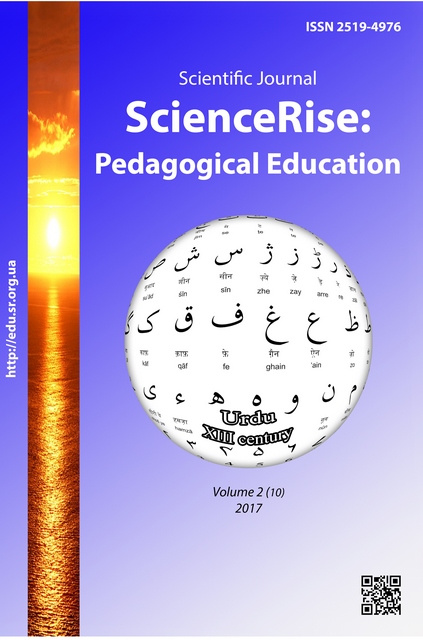Rhetorical ideal of a teacher of technical university: essence, content and structure
DOI:
https://doi.org/10.15587/2519-4984.2017.94305Keywords:
rhetorical ideal, pedagogical ideal, teacher of technical university, humanitarian directionalityAbstract
The article describes the modern rhetorical ideal of a teacher of technical university on the base of analysis of rhetorical and pedagogical concepts of ideal and academic eloquence of the prominent representatives of the native higher technical education. Rhetorical ideal of a teacher is defined as historically formed system of requirements to the speech and speech behavior, which embodiment raises the rhetorical pedagogical activity to the perfect level; as a pattern that is a reference point and stimulus for self-perfection in pedagogical rhetorical activity. The content of studied notion is elucidated using binary opposition ‘ideal – anti-ideal” and is structured by the parameters: 1)pedagogical directionality (humanitarian directionality, subordination of technical creativity to the human imperatives against the egocentric and technocratic directionality); 2)the energy of intellect (productivity of scientific thinking (“the culture of open questions”) against stereotype thinking (“the culture of ready answers”); 3) the energy of academic word (correctness, richness, expression, effectiveness of speech, introduction of audience into the searches for truth against the lack of speech culture, artificial pathos, compilation character of learning material); 4) the energy of person (dignity, pedagogical tact in ability to affect, sincerity and nobleness of feelings and words against the vanity, self-confidence; vulgarity of feelings and words); 5) citizenship (fidelity to principles, social activity “ harmony of knowledge and morality” against the unscrupulousness, social indifference, lack of moral responsibility). On the base of analysis of the results of empirical studies the author makes the conclusion that the notions of professional rhetorical ideal are the necessary pedagogical condition of the formation of rhetorical culture in future teachers of technical universities and in first turn, its motivational-value component
References
- Mihal'skaja, A. K. (1996). Russkij Sokrat. Lekcii po sravnitel'no-istoricheskoj ritorike. Moscow: Izd. centr «Academia», 192.
- Golub, N. B. (2007). Ideal suchasnogo vchytelja: movno-rytorychnyj aspekt. Visnyk Zhytomyrs'kogo derzhavnogo universytetu, 32, 132–136.
- Mac'ko, L. I., Mac'ko, O. M. (2006). Rytoryka. Kyiv: Vyshha shk., 311.
- Timonina, I. V. (2010). K Voprosu o korreljacii ponjatij «pedagogicheskij ideal» i «ritoricheskij ideal»: istoriko-pedagogicheskij aspekt. Obrazovanie i nauka, 11, 88–97.
- Zjazjun, I. A., Kramushhenko, L. V., Kryvonos, I. F. et. al.; Zjazjun, I. A. (Ed.) (2004). Pedagogichna majsternist'. Kyiv: Vyshha shk., 422.
- Suhomlyns'kyj, V. O. (1976). Rozmova z molodym dyrektorom shkoly. Vol. 4. Vybrani tvory. Kyiv: Radjans'ka shkola, 393–629.
- Chihachev, V. P. (1987). Lektorskoe krasnorechie russkih uchenyh XIX veka. Moscow: Znanie, 100.
- Onoprienko, V. І. (1990). Stanovlenie vysshego tehnicheskogo obrazovanija na Ukraine. Kyiv: Naukova dumka, 140.
- Timoshenko, S. P. (1993). Vospominanija. Kyiv: Naukova dumka, 424.
- K 120-letiju NTU «HPI». Professor V. L. Kirpichev: «Fantazija nuzhna dlja inzhenerov» (2004). Gazeta "Politehnik", No. 29-30.
- Mishhenko, O. (2013). Osoblyvosti lektors'koi' majsternosti u pedagogichnij dijal'nosti vykladachiv Katerynoslavs'kogo vyshhogo girnychogo uchylyshha v dorevoljucijnyj period. Problemy profesijnogo stanovlennja majbutn'ogo fahivcja v umovah suchasnogo osvitn'ogo prostoru. Available at: http://www.kspu.kr.ua/download/conf2013/section3/article_mishchenko.pdf
- Chernilevskij, D. V., Filatov, O. K. (2002). Duhovno-nravstvennaja kul'tura prepodavatelja vuza XXІ veka. Duhovnoe vozrozhdenie na osnove sinteza nauki, religii, kul'tury, obrazovanija. Moscow: MGTA, 3–14.
- Lytvyn, V., Andrushhenko, V., Dovgyj, S. et. al. (2003). Naukovo-osvitnij potencial nacii': pogljad u XXI stolittja. Book 3. Modernizacija osvity. Kyiv: Navchal'na knyga, 943.
- Haamer, A., Lepp, L., Reva, E. (2012). The dynamics of professional identity of university teachers: reflecting on the ideal university teacher. Studies for the Learning Society, 2 (2-3). doi: 10.2478/v10240-012-0010-5
- Romanovs'kyj, O. G.; ovazhnjans'kiy, L. L. T, Romanovs'kiy, O. G. (Eds.) (2010). Psyhologo-pedagogichni osnovy gumanizacii' tehnichnoi' osvity. Problemy ta perspektyvy formuvannja nacional'noi' gumanitarno-tehnichnoi' elity, 28, 51–59.
- Zabuzhko, O. (1999). Mova i vlada. Hroniky vid Fortinbrasa: Vybrana esei'styka 90-h. Avaialble at: http://exlibris.org.ua/zabuzko/index.html
- Sverstjuk, Je. (1999). Svoboda slova i kul'tura dumky. Na svjati nadij: vybrane. Kyiv: Nasha vira, 781.
- Los', J. D. (2008). Publicystyka j tendencii' rozvytku svitu. Ch. 1. Lviv: PAIS, 376.
Downloads
Published
How to Cite
Issue
Section
License
Copyright (c) 2017 Оксана Броніславівна Залюбівська, Олександр Васильович Діденко

This work is licensed under a Creative Commons Attribution 4.0 International License.
Our journal abides by the Creative Commons CC BY copyright rights and permissions for open access journals.
Authors, who are published in this journal, agree to the following conditions:
1. The authors reserve the right to authorship of the work and pass the first publication right of this work to the journal under the terms of a Creative Commons CC BY, which allows others to freely distribute the published research with the obligatory reference to the authors of the original work and the first publication of the work in this journal.
2. The authors have the right to conclude separate supplement agreements that relate to non-exclusive work distribution in the form in which it has been published by the journal (for example, to upload the work to the online storage of the journal or publish it as part of a monograph), provided that the reference to the first publication of the work in this journal is included.







